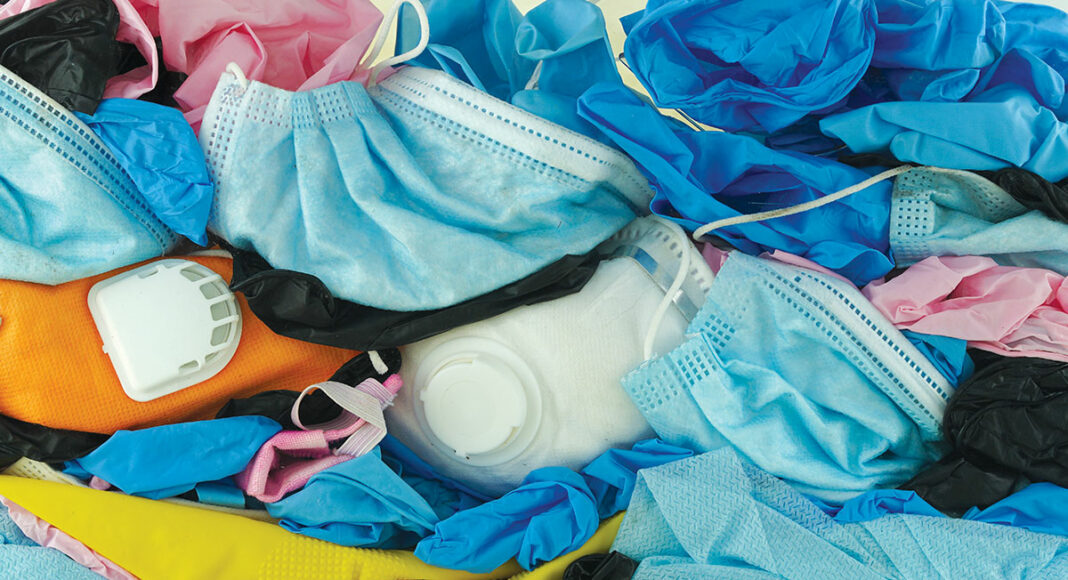The Covid-19 pandemic has devastated the world’s population in countless ways, from death and sickness to depression and anxiety, record unemployment, and gutted economies. What about the Earth itself—the oceans, beaches, atmosphere, and wildlife? How is our ecosystem doing amid the pandemic?
Locally, the answer to that question is a bit of a mixed bag. “There is good news and bad news there,” says Katherine O’Dea, executive director of Save Our Shores, a Santa Cruz-based environmental nonprofit group. On the one hand, she says, local beaches have been cleaner during the sweeping closures of the past months. “The volume of trash has been down, but we also haven’t been able to do public volunteer beach clean-ups.” Instead, she says, staff and small groups of people already sheltering-in-place with one another have been working to keep the beaches clean.
But even with fewer people leading to less litter on the coastline, it’s not all good news, because O’Dea has observed a new trash trend—not only at beaches, but also around town. “One thing I’ve seen recently is a lot of PPE (personal protective equipment) trash such as masks, latex gloves, and sanitizer bottles,” she says. “Those things are biohazards, and people should not be touching them.” This makes cleaning up these items even more challenging, and O’Dea adds that PPE is often not recyclable.
The thought of the environmental impact once much of this trash eventually ends up in the Monterey Bay is a disturbing one. “As we see more PPE in oceans, we will see wildlife ingesting them, and whether that will prove harmful to humans we don’t know yet,” O’Dea says.
Another concern O’Dea has in the pandemic is people returning to old and problematic, non-eco-friendly practices. “We are seeing people reverse their reusable habits, such as reusable bags.” She has observed an increase in litter from more disposable items in general, such as food wrappers, plastic silverware, and plastic bags. “There are recent medical studies showing that reusables are as safe as disposables,” she says. One example of the pendulum swinging back toward green sustainable practices is that some grocery stores are starting to allow reusable bags once again.
There is also the issue of toilet paper—perhaps, along with the mask, the most enduring and iconic visual symbol of Covid-19. Early on in the pandemic, it was such a hot commodity that panic-buying and hoarding of the stuff left many grocery store aisles bare across the country. This phenomenon helped shed light on toilet paper’s dirtiest secret: It is horrible for the environment.
Most at-home toilet paper is made from virgin material sourced by cutting down trees. This decimates forests, not only spoiling natural habitats for animals, but also reducing carbon sinks and leading to more greenhouse gases. According to the Natural Resources Defense Council, Americans make up only 4% of the world’s population but use more toilet paper than any other country—accounting for 20% of global consumption. Spurred by pandemic-induced shortages and environmental concerns, many eco-conscious people are now considering alternatives, such as toilet paper made from bamboo and even switching from toilets to bidets.
“Climate change is continuing. It has not taken a break during the pandemic,” O’Dea says. “There has been a little relief, but not enough to reverse it. Nature is incredibly resilient, but it needs us to take a pause in order to regenerate itself.”
She then cautions that the link between environmental practices and pandemics can be a causal one. “If we go back to disregarding nature, we’re going to see more pandemics. As we destroy more animal habitats, more pandemics are likely as viruses jump from animals to humans, as was the case with Covid-19.”
Worldwide quarantines and stay-at-home orders have forced humans to drastically reduce their carbon footprint, which has led to some boons for environmental health—temporary though they may be. “With people driving less, we’ve seen less carbon emissions,” says O’Dea. “The air is cleaner and clearer, but pollution is starting to come back with restrictions being lifted.” This is supported by recent data from NASA and the European Space Agency showing pollution decreased by about 30% as a result of the pandemic shutdowns in epicenters such as Wuhan, China, in Italy, and in the U.S. Even heavily populated and infamously smoggy cities like Los Angeles saw their clearest skies in decades.
Perhaps the most encouraging environmental takeaway from the pandemic is that our ecological behavior as human beings really can make a difference. If just a couple months of quarantines and reduced carbon emissions can positively and quantitatively impact our environment like it has, imagine how sustained years of global solidarity and good shared environmental practices could impact climate change.
“A lesson we should take away is that when we’re forced to take a pause on driving and consuming, we see environmental gains and improvements,” O’Dea says. “But if people don’t recognize and realize that, and go back to old habits, all environmental gains will be lost and we will see negative environmental impact once again.”














Andrew,
What seems to be the most important question to me is where all the medical waste from hospitals and other facilities ends up. The huge volume of plastics/PPE used for the Covid wards, etc. probably have to be handled by hazmat disposal companies, and then likely incinerated somewhere.
That’s the story I’d like to see. I’m glad the SOS folks are in the mix, but there’s a much bigger issue.
Thanks, Lee from Soquel
“Disposable” regular masks* are washable. They are easily hand washed and hung out on the line in the sun for UV sanitizing. Skip the gloves and you’re just left with the impact of a tiny bit more laundry. They clean up very well, no different than a cloth mask.
Glove wearing should be actively discouraged & educated on; it’s wasteful, has no benefit and the environmental impact is huge.
*Do not wash N95/ KN95 masks. They have an electrostatic filter that is destroyed w/ moisture.